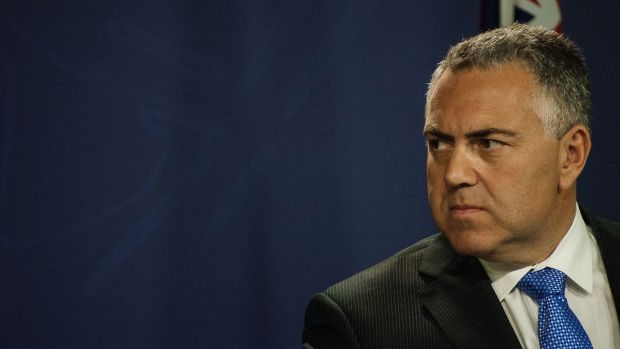EDITORIAL

Joe Hockey’s remarks did not deserve the kneejerk opprobrium they attracted. Photo: Christopher Pearce
No sooner had Treasurer Joe Hockey returned from his summer holiday and attempted to shape the debate about the financial challenges facing Australia, then he was subject to ridicule. The Herald thinks those attacks were unfair, and mainly confined to the more malign influences in social media. In mentioning that some people alive today may live to the age of 150, the Treasurer was not only drawing on a considerable body of medical and scientific opinion, he was discussing, in a welcome conversational style, Australia’s demographic change, its dramatically aging population, and the serious national challenge this presents.
His remarks did not deserve the kneejerk opprobrium they attracted.
While Hockey has been a forceful figure in parliamentary debate, his stewardship of the Treasury portfolio has been beset by gaffes, accidents and a poorly prepared and delivered budget message.
When Tony Abbott was leader of the opposition and made Hockey his Treasury spokesman, he argued that he was a great retail politician and could thus deliver the second-most important message of any government, the fiscal and budget narrative.
But Hockey has not lived up to that billing. Since the Abbott government came to power, Hockey has failed to deliver the coherency of argument to convince voters to take the harsh medicine needed to sustain the nation’s long term prosperity.
While Hockey has been a forceful figure in parliamentary debate, his stewardship of the Treasury portfolio has been beset by gaffes, accidents and a poorly prepared and delivered budget message. All this compounded the political problems stemming from a genuinely harsh budget. The required narrative, the pre-budget framing – a candid and painstaking discussion with the electorate – imply didn’t happen.
And there were mixed messages. For instance, the Treasurer talked about a budget emergency but then delivered a budget that included an incongruously generous paid parental leave, and little crackdown on middle class welfare – while imposing burdens on the young, the poor and the sick.
As the government’s popularity dropped after the budget, Hockey seemed to dig the hole deeper with a series of off-the-cuff remarks, such as saying that poorer people didn’t drive as much as the middle class.
On Monday, Hockey returned from holiday and did a radio interview in which he discussed Australia’s aging population. His aside, “that somewhere in the world today, it is highly probable a child has been born who will live to be 150” was leapt upon, taken out of context, and spun through the echo chambers of ridicule on social media.
It can all stay in social media. It has no place in the actual policy discourse. The Treasurer was simply putting up the big question: how are we going to pay for welfare and health spending that is growing faster than the inflation rate, faster than the economy and faster than government revenues?
This is the big question. It is the question the Labor opposition has yet to answer; at least not in sufficient substance. The government’s minority position in the Senate has seen the politics of gridlock, as Labor, the Greens and the minor parties combine to block most of the tough fiscal measures.
The political gridlock in Canberra has had a terrible impact on business confidence and is thus damaging the economy.
But Hockey is not ducking the big policy questions. Nor is the new Minister for Health, Sussan Ley. She is saying that Australia cannot afford to pay for Medicare in its present form, at present growth rates, with its multi-billion-dollar funding deficits. These deficits have to be paid for with taxes, fees, or cuts to funding elsewhere. Using debt to paper over the looming $20 billion Medicare deficit is not a viable option.
This is the challenge Hockey was engaging with when he talked about Australians living longer. Children today can expect to live into their mid-eighties whereas life expectancy a hundred years ago was 55 for men and 59 for women. Overall, we are outliving our ability to fund our retirement and aged care.
The cost of paying for a population that does not have enough saved for retirement, where the number of people aged over 65 is growing rapidly, is a greater inter-generational challenge than the country has ever faced before. We commend the Treasurer’s renewed foray into this area of public policy, and hope he finds a better way in 2015 to frame and shape this narrative as he prepares his second budget.
